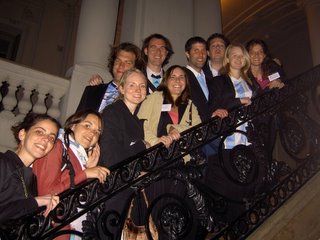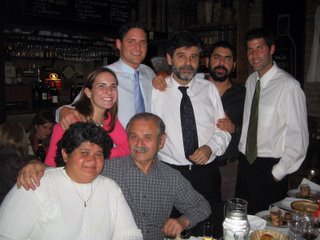Yanquis
The origin of the term Yankee is blurry.
If anyone cares, some claim Yankee was a derogatory term the English slapped on the Dutch in the early
Whatever the origin, the use of the term Yankee (or yanqui as it’s spelt down here) is common place in
Note: since Canadians are always confused with Americans, they often fall into the yanqui category. Since the term is not derogatory and I don’t have any serious reservations about being mistaken for an American, I have come to accept being mislabelled as a yanqui-argentino.
Most Argentines, myself included, generally enjoy the growing presence yanqui expats or at the very least get great laughs from mocking the stereotypical yanqui tourists. Many of the expats I’ve met down here are well-educated, cultured, and have embraced Argentine society with a passion I have never witnessed.
My opinion of the gringo community in
Degenerates aside, most people visit
While
While there are countless tourist traps and sex tourism businesses, Buenos Aires is so large and offers so much more, that it is not in danger of becoming a 1950s Havanna or a modern day San José.
The expats I have met and befriended in the past few months provide some anecdotal evidence for this generalization.
In the social sector, I became good friends with the director of HelpArgentina, Lloyd Nimetz, as well as a various inspirational members of the team. The organization provides a fundraising bridge between the international donor community and the Argentine social sector.
Although it is a relatively new organization, they have undertaken the ambitious mission of connecting over 30 hardworking, yet often isolated and financially constrained nonprofits with the global philanthropic marketplace. By becoming part of HelpArgentina’s network, an NGO is certified as a transparent, efficient and ethical organization. This certification in turn leads to greater credibility and visibility in the international donor community.
This past month I attended their award ceremony titled Social Ambassadors 2005, Solidarity without Borders. I watched five people working overseas to help the Argentine social sector receive recognition for their work.

Picture: Here are members of the HelpArgentina staff after the award ceremony.
Two weeks later, HelpArgentina held their first annual International Solidarity Night. The event mobilized 1200 people to participate in 80 dinners in 24 cities, in 11 countries, in order to raise money for 26 different social organizations in
My family, along with Lloyd, hosted a dinner to support Los Piletones neighbourhood council. My grandfather, who has been volunteering in the barrio for a few years now, has always pointed out that a huge obstacle to development is the lack of sustainable funding for vital infrastructure. He was pleasantly surprised by how such a young, expat-led organization, such as HelpArgentina, could demonstrate such a strong sense of international solidarity.
My father, who lives in
Through the blogosphere, I have kept up with several interesting expat journals.
A couple of more expat blogs which have caught my eye are: GoodAirs and Buenos Aires, City of Faded Elegance. At GoodAirs, Ian and Cintra cover a wide variety of contemporary issues from an inquisitive, and often humourous, journalistic point of view. At City of
Lastly - as I realize what time it is - I have Monday night soccer games with a group of American and European expats. The level of play is surprisingly competitive. Not quite as cut throat as playing with a bunch of Argentines, but at least the sportsmanship means that we can all enjoy post-game drinks and pizza without holding any game-time grudges…


12 Comments:
Of course the origin of "gingo" is just as blurry. Of the possible theories:
1. Comes from the Mexican-American war because the US wore "green" uniforms.
2. Comes from the Mexican-American war because US soldiers sang "Green grow..."
3. Refers to the Spanish word for Greek "griego".
4. Comes from an old Spanish term for Italians (which would explain the use in Argentina).
I found this blog surfing. I really enjoy it.
Many of friends from the Argentine tango community, go there often, for milongas and classes in tango. We tango dancers, eat and sleep BsAs.
Regards.
Nice blog! (it´s the first time I read foreign opinions about my country!)
Y te felicito por haber ido a ver el clásico del lugar que corresponde: azul y oro!
Boz,
Yes, the "gringo" and the "yanqui" titles have another thing in common: interesting yet confusing etymologies.
Renegade eye,
Thanks. The expat tango fanatic is indeed a special and rapidly growing breed. I don't know if you've heard of Marina Palmer and her book, Kiss and Tango: Looking for Love in Buenos Aires, but you should check it out: http://www.amazon.com/gp/product/customer-reviews/0060742925/ref=cm_cr_dp_pt/002-1011706-4317627?%5Fencoding=UTF8&n=283155&s=books
P.,
Yes, be careful. The "yanqui" label loses its meaning most places outside of Argentina. I can't imagine it being anything close to a neutral term in Texas...
Fernando,
Thank you. I hope you don't feel cheated: I am not technically a "foreigner". I was born in Buenos Aires, moved to Toronto, Canada, when I was four. 21 years later, one year ago, I moved back to Argentina. Despite having an Argentine passport, I do sometimes feel like a foreigner in this country (usually for the better but sometimes for the worse).
Interesting read! I wandered over here from "Vislumbres" and think you may be a former classmate of mine from University days at Laurier. Sounds like you are up to some interesting stuff. All the best in your work.
- Nisha Panchal
Hey Nisha,
I saw your name on Vikrum's comment section a few times. You made several references to Toronto, and your name sounded familiar but I wasn't too sure where from... It turns out it was Laurier! Do you remember what class we took together? Vikrum is a friend of mine from my time in Costa Rica, 2003...small world...
Hey Diego,
I'm Vikrum's friend and travel buddy on his travels in NE India. He pointed me to this excellent post and I'm writing just to say that the co-incidences (that Vikrum's told you about regarding Puerto Rico and Costa Rica and the Alliance) continue. For, I know Lloyd too. We used to both work at Ashoka and I once drove him up from DC to NYC to visit his parents. He's a great guy and one I'd like to meet again. So do say hi to him from me next time you see him, and congratulate him on the growing success of Help Argentina.
Hi Nisha and Diego,
Yes it is a small world!
Diego,
Another great article. Nice work.
One thing I've noticed is that different countries attract different types of Americans. As you mentioned, Costa Rica seems to attract the worst of the worst - sex tourists, pedophiles, "kauhmohs," idealistic change-the-world types whose ambitions are crushed in "human progress" bureaucracies...
Anyway, India attracts a wholly different type of American than Costa Rica. While in Costa Rica, I was disappointed by many of the expats, I have met a different type of Yanqui here. Many (but not all, of course) of the gringos here have a genuine interest in Indian culture and history.
On a different note, I have a question for you:
In Costa Anti-nica (I mean Costa Rica), a lot of Ticos assumed that all Americans love George W. Bush, love invading other countries, cannot speak Spanish, and are filthy rich. Interestingly, the more educated the population, the more faith there is in these stereotypes. For example, I found a lot more anti-American prejudice in the illustrious Universidad de Costa Rica than in the streets of Zapote or the rural areas of Guanacaste.
I am rambling, but here is my point: in Costa Rica there is a very fixed, almost immutable idea of an American. India has surprised me because I have not seen such a fixed idea. Indians explain this by saying, "We Indians know what it is like to have bad governments that do not represent the people, so we know that the government of the United States does not represent the American people."
Here is my question: do you find the Argentines (in regards to the Yanquis) to be more like the Indians or more like the Ticos? Or are they perhaps somewhere in between?
Roshan,
Wow, these coincidences are bizarre. I didn't even mention that I met Lloyd through Christian, who runs Princeton in Latin America, and is a mutual friend of ours (Vikrum and I) from our time in Costa Rica.
It turns out that Lloyd once worked with Christian's father, and when Christian was researching Argentina's NGO sector, he came across HelpArgentina. He then asked me to get in touch with Lloyd.
I will pass along your regards the next time I see him.
Vikrum,
It's hard to address your question, but if I were to generalize, I would say that Argentineans treat Americans quite well.
Most anti-American sentiments are rationally directed towards the US government, particularly Bush.
However, there is a loud minority, mostly the radical left, which hates almost everything American. A few even express themselves violently (such as setting off little bombs at American banks or McDonald's).
Now that I think about it, I would say that the above can apply to Costa Rica (the violence aside).
Although I do understand the point you are trying to make about Ticos, you sort of contradict yourself. First you say: "I found a lot more anti-American prejudice in the illustrious Universidad de Costa Rica than in the streets of Zapote or the rural areas of Guanacaste."
But then you say: "in Costa Rica there is a very fixed, almost immutable idea of an American."
In Costa Rica, is there really a "very fixed, almost immutable idea of an American"? Or, while one can generalize, anti-American sentiments vary greatly depending on where you go or who you talk to?
Diego,
Your point about contradiction is well taken.
I guess working at the place where we worked... combined with spending time at the university... led me to spend a disproportionate amount of time with those Ticos who have a visceral anti-American sentiment. I should have been more fair in my last comment.
Happy New Year, Diego! So looking at your blog, does this mean you are now an ex-pat?
- Nisha
Wow, what a small world it really is.
This is Megan, we met through our dear friend in common, miss Kara, when down in BsAs. Can't believe it! I just started a random blog and was missing Argentina so I searched the AR blogs and found yours.
How is everything? Your blog is so interesting and informative, and you are doing some amazing work that I really admire.
Well, escribeme un email si quieres, warner.meg@gmail.com. I regretted not getting your email and it is funny how these things work out.
Look forward to hearing from you.
Un beso, Meg
Post a Comment
<< Home